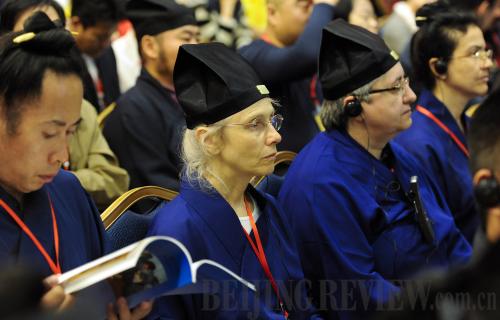|
 |
|
OVERSEAS ADHERENTS: Foreign Taoists attend the International Taoism Forum at the Hengshan Mountain on October 24 (CNSPHOTO) |
A forum on how to integrate Taoist philosophy with social reality, and how to build a harmonious world for humanity, was held at the Hengshan Mountain, a scenic site renowned for Taoist culture in central China, from October 23-25.
The International Taoism Forum on the outskirts of Hengyang in Hunan Province attracted 500 scholars and religious figures from China and other 19 countries. It was co-sponsored by the China Taoist Association (CTA) and China Religious Culture Communication Association.
During the event, a number of Western Taoists in Chinese traditional Taoism robes appeared at meetings and forums. What is the fascination that attracts these foreigners to make long journeys to attend a Taoism forum?
As an indigenous Chinese religion, Taoism is not as popular as Buddhism internationally. But its philosophy, particularly the wisdom of maintaining balance between humanity and nature, are highly valued and advocated by a growing number of people in both the East and West today.
The origin of Taoist doctrines can be traced to ancient philosopher Laozi (571-471 B.C.), whose famous work Tao Te Ching is widely regarded as the Taoism classic. Tao Te Ching explains the deep and broad thoughts of Taoism in only 5,000 words, such as "the Way" (Tao), peace, and harmony between humanity and the cosmos.
With the help of interesting stories, it's easy to understanding the profound meanings of Taoism, said Martin Palmer, a British sinologist and Secretary General of the Alliance of Religions and Conservation at a dialogue on "the way of nature and harmony" with Chinese linguist Xu Jialu at the forum.
There are a lot of legends and myths about Taoism. "I usually cannot help laughing when identifying people's quick wit and wisdom in reading humorous stories in the Tao Te Ching and I Ching," said Palmer.
Palmer became fascinated by the philosophy when he cooperated with CTA on environmental protection in 1995.
"Taoists are good at collecting stories from their lives to inspire people. They promote the old religion among people by metaphors, which is a clever method," Xu said.
Taoists regard the Tao, and virtue as the general principles of their beliefs and behavior, which is also a constant topic for cultural scholars.
"There are no clear explanations for Tao because Laozi wrote 'the way can be talked about but not specified' in the first sentence of his book Tao Te Ching," said Xu. "The deep thoughts of 'the Way' can only be understood by one's heart. If one must define 'the Way,' it should be regarded as the law governing the world and humanity."
"'The Way' is an appropriate translation for Tao in English, but some subtle connotations of Tao are lost in translation, due to cultural differences in communication between the two languages," Xu said.
Taoism had made it clear mankind must respect nature and follow the law of nature 2,000 years ago, which explains why Taoism beliefs and thoughts are still popular today.
"It urges us to reflect on our unlimited desires, the biggest problem the society and humanity face," said Xu.
Palmer said he was inspired by Taoist wisdom, such as the belief in man being an integral part of nature. For hundreds of years, the West has been arguing whether the human is endowed with rights to exploit the Earth without paying anything back.
"It can make up for the defects in Western philosophy. Scholars and Taoists should make advantages of ancient wisdom and find solutions for current problems in the world," said Xu. | 